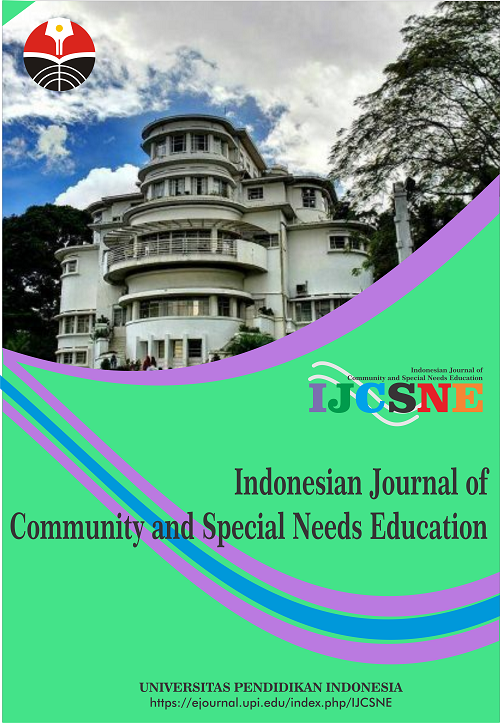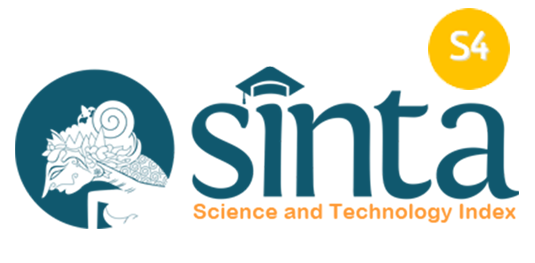Family as An Educational Environment That Can Provide Science Education for Children with Special Needs
Abstract
Keywords
Full Text:
PDFReferences
Aldrich, D. P., and Meyer, M. A. (2015). Social capital and community resilience. American Behavioral Scientist, 59(2), 254-269.
Al-Rowaily, M. A., AlFayez, A. I., AlJomiey, M. S., AlBadr, A. M., and Abolfotouh, M. A. (2012). Hearing impairments among Saudi preschool children. International Journal of Pediatric Otorhinolaryngology, 76(11), 1674-1677.
Avramidis, E., Bayliss, P., and Burden, R. (2000). A survey into mainstream teachers' attitudes towards the inclusion of children with special educational needs in the ordinary school in one local education authority. Educational Psychology, 20(2), 191-211.
Barr, M., and Shields, N. (2011). Identifying the barriers and facilitators to participation in physical activity for children with Down syndrome. Journal of Intellectual Disability Research, 55(11), 1020-1033.
Giagazoglou, P., Kokaridas, D., Sidiropoulou, M., Patsiaouras, A., Karra, C., and Neofotistou, K. (2013). Effects of a trampoline exercise intervention on motor performance and balance ability of children with intellectual disabilities. Research in Developmental Disabilities, 34(9), 2701-2707.
Gutman, L. M., and McLoyd, V. C. (2000). Parents' management of their children's education within the home, at school, and in the community: An examination of African-American families living in poverty. The Urban Review, 32(1), 1-24.
Haverhals, B. (2007). The normative foundations of research-based education: Philosophical notes on the transformation of the modern university idea. Studies in Philosophy and Education, 26(5), 419-432.
Israel, G. D., Beaulieu, L. J., and Hartless, G. (2001). The influence of family and community social capital on educational achievement. Rural Sociology, 66(1), 43-68.
Lemke, J. L. (2001). Articulating communities: Sociocultural perspectives on science education. Journal of Research in Science Teaching, 38(3), 296-316.
Lie, A. (2007). Education policy and EFL curriculum in Indonesia: Between the commitment to competence and the quest for higher test scores. TEFLIN Journal, 18(1), 01-15.
Palla, G., Derényi, I., Farkas, I., and Vicsek, T. (2005). Uncovering the overlapping community structure of complex networks in nature and society. Nature, 435(7043), 814-818.
Pashler, H., McDaniel, M., Rohrer, D., and Bjork, R. (2008). Learning styles: Concepts and evidence. Psychological Science in The Public Interest, 9(3), 105-119.
Perkins, K., Columna, L., Lieberman, L., and Bailey, J. (2013). Parents’ perceptions of physical activity for their children with visual impairments. Journal of Visual Impairment and Blindness, 107(2), 131-142.
Reinehr, T., Dobe, M., Winkel, K., Schaefer, A., and Hoffmann, D. (2010). Obesity in disabled children and adolescents: An overlooked group of patients. Deutsches Ärzteblatt International, 107(15), 268.
Sari, E. (2014). The relation between Islamic education environment management and student emotional intelligence. International Journal of Nusantara Islam, 1(2), 206-222.
Schaal, S., Bogner, F. X., and Girwidz, R. (2010). Concept mapping assessment of media assisted learning in interdisciplinary science education. Research in Science Education, 40(3), 339-352.
Stevenson, R. B. (2007). Schooling and environmental education: Contradictions in purpose and practice. Environmental Education Research, 13(2), 139-153.
Story, M., Neumark-Sztainer, D., and French, S. (2002). Individual and environmental influences on adolescent eating behaviors. Journal of the American Dietetic association, 102(3), S40-S51.
Stuckey, M., Hofstein, A., Mamlok-Naaman, R., and Eilks, I. (2013). The meaning of ‘relevance’in science education and its implications for the science curriculum. Studies in Science Education, 49(1), 1-34.
DOI: https://doi.org/10.17509/ijcsne.v2i2.43752
Refbacks
- There are currently no refbacks.
Copyright (c) 2022 Universitas Pendidikan Indonesia

This work is licensed under a Creative Commons Attribution-ShareAlike 4.0 International License.















